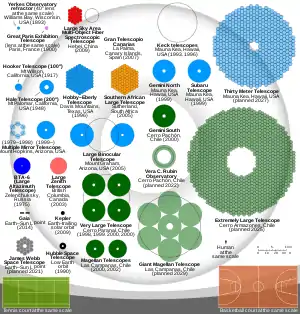Overwhelmingly Large Telescope
The Overwhelmingly Large Telescope (OWL) was a conceptual design by the European Southern Observatory (ESO) organization for an extremely large telescope, which was intended to have a single aperture of 100 meters in diameter. Because of the complexity and cost of building a telescope of this unprecedented size, ESO has elected to focus on the 39-meter diameter Extremely Large Telescope instead.
 | |
| Alternative names | OWL |
|---|---|
| Organization | European Southern Observatory |
| Wavelength | 0.32 μm (940 THz)-12 μm (25 THz) |
| Telescope style | Cassegrain reflecting telescope optical telescope |
| Diameter | 60, 100 m (196 ft 10 in, 328 ft 1 in) |
| Collecting area | 2,827, 7,854 m2 (30,430, 84,540 sq ft) |
| Focal length | 175 m (574 ft 2 in) |
| Website | www |

History
OWL was first proposed in 1998, and at that time was estimated to be technologically feasible by 2010–2015.[1]
While the original 100 m design would not exceed the angular resolving power of interferometric telescopes, it would have exceptional light-gathering and imaging capacity that would greatly increase the depth to which humanity could explore the universe.[2] The OWL could be expected to regularly see astronomical objects with an apparent magnitude of 38, or 1,500 times fainter than the faintest object that has been detected by the Hubble Space Telescope.
All proposed designs for the OWL are variations on a segmented mirror, since there is no technology available to build and transport a monolithic 60- or 100-meter mirror. The operation of a segmented mirror is somewhat more complicated than a monolithic one, requiring careful alignment of the segments (a technique called cophasing). Experience gained in existing segmented mirrors (for example, the Keck telescope) suggests that the mirror proposed for the OWL is feasible. However, the projected cost (of around €1.5 billion) was considered too high, so the ESO is now building the smaller European Extremely Large Telescope around 39 m in diameter.[3][4][5] Also, there appears to be some inconsistency as to the actual construction costs of the OWL, with some estimating its cost an order of magnitude higher (EELT currently at €1.3 billion,[6] equivalent to around $1.6 billion, scaled using D^2.77 proportionality assuming a 100 meter diameter yields $21 billion).[7]
It has been estimated that a telescope with a diameter of 80 meters would be able to spectroscopically analyse Earth-size planets around the forty nearest sun-like stars.[8] As such, this telescope could help in the exploration of exoplanets and extraterrestrial life (because the spectrum from the planets could reveal the presence of molecules indicative of life).
See also
References
- Gilmozzi, R.; et al. (1998). European Southern Observatory. "The future of filled aperature telescopes: Is a 100m feasible?" (PDF). Advanced Technology Optical/IR Telescopes. SPIE. VI (3352): 778. Bibcode:1998SPIE.3352..778G. doi:10.1117/12.319284. S2CID 12512243. Retrieved 25 Oct 2018.
- http://www.eso.org/sci/facilities/eelt/owl/index_3.html
- "OWL 100-m telescope". www.eso.org. Retrieved 2019-10-08.
- http://www.eso.org/projects/e-elt/
- "Record mirror for Euro telescope". BBC News. 2006-08-07. Retrieved 2010-03-27.
- [email protected]. "Funding boost for ESO's Extremely Large Telescope". www.eso.org. Retrieved 2020-12-05.
- van Belle, Gerard T. [www2.lowell.edu/users/gerard/publications/van_belle_meinel2_2004.pdf "The Scaling Relationship Between Telescope Cost and Aperture Size for Very Large Telescopes"] Check
|url=value (help) (PDF). Lowell Observatory. - Gilmozzi, Roberto (May 2006). "Giant Telescopes of the Future". Scientific American.
External links
 Media related to Overwhelmingly Large Telescope at Wikimedia Commons
Media related to Overwhelmingly Large Telescope at Wikimedia Commons- The ESO 100-m optical telescope concept
- OWL BLUE BOOK – Phase A design report
- ESO - ELT
- The Future of Filled Aperture Telescopes: Is a 100 m feasible?
